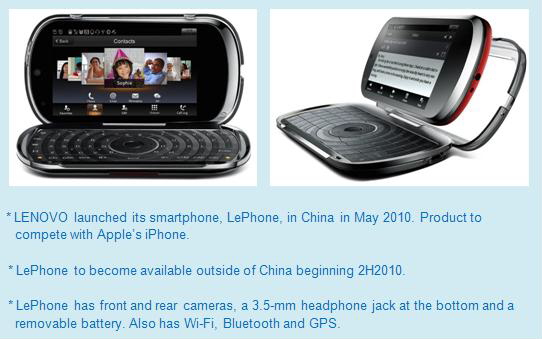
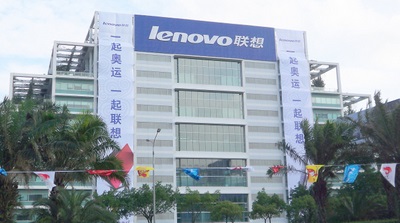
LENOVO GROUP Ltd (HK: 992) is hoping to move back into third place for global PC market share after recently relinquishing the spot to Taiwan's Acer.
NextInsight also learns from a company official that the Beijing-based firm -- best known for its computers -- is eyeing more contribution from higher-margin products like the Android-based LePhone, its answer to Apple’s iPhone.
The Hong Kong-listed firm’s CEO Yang Yuanqing had earlier even said he expects the new smartphone will take over top spot in China this year from Apple.
But the company remains hardwired for computer manufacturing, at least into the foreseeable future.
Lenovo saw its PC shipments jump nearly 60% in the first three months, double the average growth in the industry.
As the fourth biggest vendor of PCs in the world with an 8.8% share, up from 6.9% just a year ago, it is making progress in its attempts to catch HP, Acer and Dell.
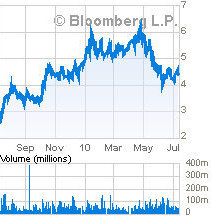
And although it is tops in China with a 28.6% market share, Lenovo was not content to be out of the global medal round.
"We are number four now in the world, that is true, but it was only a short time ago that we were number three. So we of course are not satisfied,” the company’s Government Affairs Officer told NextInsight.
Speaking at the firm’s massive Shenzhen research facility, the officer, who asked not to be named, said that because Taiwan-based Acer had slipped ahead of them in the global PC market share rankings, Lenovo would work even harder to keep its ear to the ground and stay ahead, not apace, of trends and industry shifts.
"We have to keep our finger on the pulse of business sentiment especially, because bulk orders from the corporate sector are very important for us,” she said.
I asked her if she could tell where business sentiment was headed for the remainder of the year, and if the company was taking steps now to meet the anticipated demand.
"I am not in a position to provide specific forecasts. In fact, in this business it is very hard to know what will happen next month let alone by year end. Therefore, it is very important for Lenovo to be in a position to change and adapt quickly to keep up with growth and to make any adjustments necessary.”
Lenovo’s revenue in the January-March quarter rose a robust 56% year-on-year to 4.3 bln usd, spurred by a 59% jump in PC shipments over the period.
However, net profit came in at just 13 mln usd compared to 264 mln in the first three months of 2009.
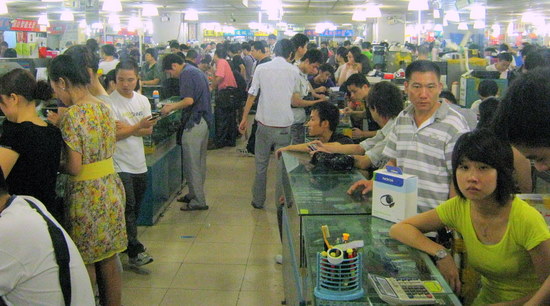
The company, which has a market cap of 43.1 bln hkd, also managed to be in the black for the financial year ending this March after suffering a loss in the year-earlier period.
Its home market of China remains its fastest major growth region, with January-March sales up 67%, meaning that some 45% of the company’s products were sold domestically.
The company, which took over IBM’s struggling PC division in 2005 for 1.75 bln usd, remains at heart a computer manufacturer.
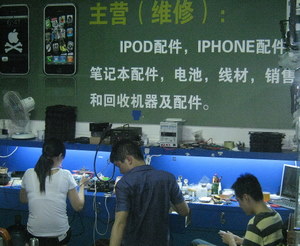
The Shenzhen complex was a beehive of activity which was somewhat out of sync with the latest staffing news from Lenovo, which laid off 3,000 workers last year and cut another 2% of its global workforce in February.
The company currently employs 20,000 around the world, with 1,600 in the US alone, thanks in large part to carryovers from the 2005 IBM PC unit pickup which brought the ThinkPad family of notebooks under the Lenovo Group umbrella.
In addition to Shenzhen, Lenovo also has research centers in its headquarters city of Beijing, and also in North Carolina, Singapore, Shanghai, Xiamen, Chengdu and Kanagawa Prefecture, Japan.
Upwardly Mobile
Earlier this year, a poll of analysts commissioned by Bloomberg had forecasted a January-March net profit of 30.7 mln usd for Lenovo, but the bottom line fell far short in large part thanks to costs associated with its return to the mobile segment, with the company paying 200 mln usd in January to buy back Lenovo Mobile Communication Technology, which it originally shed in 2008 when the global recession hit.
The repurchase is all part and parcel of the Beijing-based firm’s strategy of moving more aggressively into the mobile space, not a bad idea since its Lenovo Mobile device shipments rose 32% year-on-year between January and March, and it is now a top three player in China’s mobile handset market.
The flagship offering of this segment is Lenovo’s recently unveiled LePhone, which is hoping to directly take on Apple's wildly popular iPhone in the Chinese market.
Although a reasonably thorough search of Shenzhen’s electronics market of Huaqiangbei did not produce any LePhone sightings this week, the company did unveil the product in Beijing in April, with its WCDMA protocol system gearing it specifically for the domestic market.
The company has also announced that it plans a LePhone product launch outside China later this year, but details on prices, carriers and initial target markets were missing.
Reviewers have said it takes several cues from market leading Apple’s iPhone, and also offers a separate physical keyboard option.
If Lenovo’s PC success at home (No.1 in China) and its rapid rise to No.3 in China for the mobile sector can be continued, or replicated overseas in any comparable way, this company’s H-shares may be well worth looking into.
Incorporated as Legend in Hong Kong in 1988, Lenovo was as of late 2008 50.4% owned by public shareholders, 42.3% by Legend Holdings Ltd, 6.6% by Texas Pacific Group (TPG Capital), General Atlantic LLC and Newbridge Capital, and 0.7% by the directors.
Because the Chinese Academy of Sciences, a Chinese government agency, owns 65% of Legend Holdings, the Chinese government is Lenovo’s largest shareholder, effectively owning around 27%.
Armonk, NY-based IBM became the owner of 18.9% of Lenovo in 2005 following the latter’s acquisition of IBM’s PC division. Since then IBM has steadily reduced its shareholding in Lenovo, dipping below the 5% reporting disclosure threshold in mid-2008.







